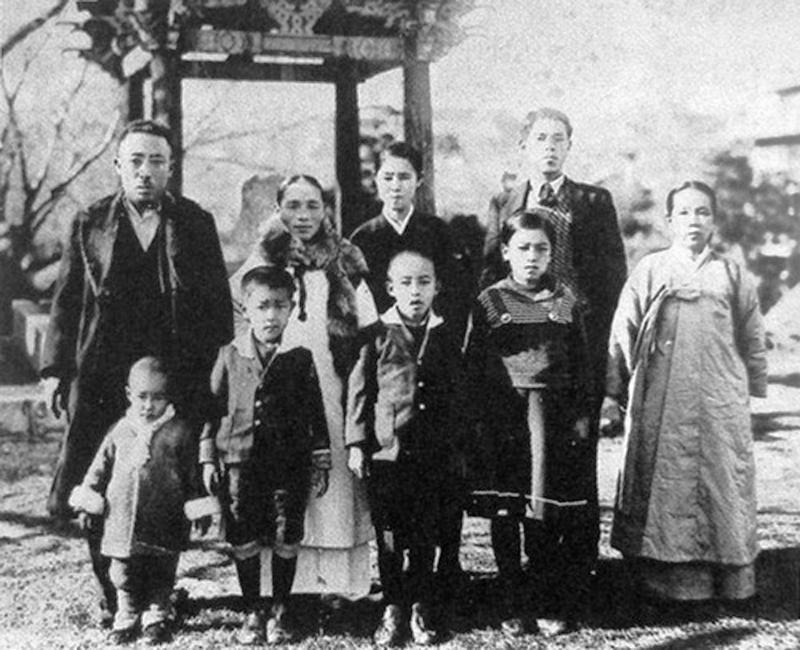Posted on January 7, 2023

▲ A family photo taken during a trip to Mount Kumgang in 1935. Nam-june Paik is on the far left in the front row, followed by Nak-seung Baek, his father. ⓒ Nam June Paik Art Center
Artist Nam-june Paik (1932-2006) was the son of the president of Taechang Textile, the largest textile company after liberation, but abandoned his father’s advice to ‘learn business management’ and chose his own world. Nam June Paik explains that one of the reasons he took a different path from his father was a trip to Hong Kong at the age of 17.
Lee Yong-woo, an art critic who served as the president of the Korean Society of Contemporary Art and a professor at Korea University, said in his book
According to this, Nam June Paik, who left for Hong Kong with a passport stamped with the number 7, recalled that he learned that the Indian man who approached his father on the plane actually worked as an arms dealer. He later said he was surprised to find Czech automatic rifles in the luggage of a person visiting his father from Singapore.
According to Nam June Paik’s memory, his father was also involved in arms smuggling for the Syngman Rhee regime, apart from his official business. In 1949, President Syngman Rhee was promoting the formation of a 200,000-strong Youth National Defense Corps, formally linked to the Ministry of National Defense, but in reality no different from a private unit.
The Youth Defense Corps, a separate military organization from the Armed Forces, was organized on March 15, 1950, right before the Korean War, but disbanded in the midst of the sudden outbreak of war. The war had broken out before the organization was ready to operate. If Nam June Paik’s father was involved in arms smuggling in the year before the Korean War, the possibility that it was related to the Youth National Guard cannot be ruled out. If it was related to the armed forces, covert activities would not have been necessary.
According to Nam June Paik’s writings quoted in the above book, he was disappointed by his father’s involvement in secret weapons dealings with the regime. He reportedly hated that “he had to lobby to do business and be unconcerned with lies”.
Even during the Japanese colonial period, he boldly adhered to politics and business
Baek Nak-seung, father of Nam-june Paik, was born in 1896, two years after the Donghak Revolution and the Sino-Japanese War. Baek Nak-seung, born as the fourth son of Baek Yun-soo, a city merchant who was a privileged entrepreneur in the Joseon Dynasty, graduated from Meiji University and Nihon University in Japan, then participated in the business management of Baek Yun-soo and contributed to its expansion.
Like Nam-june Paik’s recollection of being disappointed with his father who lobbied, the key keyword penetrating Baek Nak-seung’s business management was collusion between politics and business. On November 16, 1966,
Baek Nak-seung succeeded in receiving a preferential loan from the government’s dollars through collusion with Rhee Syng-man. The above article says that the facilities that Taechang Textile purchased with the money were transferred to Samsung Group Cheil Industries. Baek Nak-seung could not pay the money properly. This was an opportunity for Taechang Textile to decline amid the government’s demand for repayment.
Syngman Rhee also felt burdened by Baek Nak-seung, the sponsor, in the end. It was Rhee Seung-man who abandoned Baek Nak-seung at the last minute. On December 8, 1955, an article in the
▲ Article dated December 8, 1955, “Buying only confiscated ledgers ‘Taechang scalpel for tax evasion’” ⓒ Kyunghyang Shinmun
Baek Nak-seung has been involved in management since he was a student at Nihon University. In 1916, when his father, Baek Yoon-soo, founded Daechang Trading Co., Ltd., at the age of 20, he was appointed as a director of the company. After that, he expanded his business using his family’s company or his own company as a stepping stone. Baek Nak-seung’s management style at that time showed the same style as during the Rhee Syng-man administration. Even during the Japanese colonial period, he boldly adhered to politics and politics.
Giving donations, a typical pro-Japanese method of businessmen, was not left out of his management. Volumes 4-7 of the
On December 15, 1941, published 7 days after the Japanese army’s surprise attack on Pearl Harbor, Baek Nak-seung, who made a donation of 75,000 won to the Dongdaemun Police Station and revealed his identity in the
To the people who came to hear the news of the ‘impressive’ donation, the wife said her husband was out of the country and said, “I had been waiting for a national defense contribution to pay back the country’s holy grace, but when this big war broke out, I took the procedure.” I told you what I used to say. The above article described the happy family of Baek Nak-seung, the ‘donation angel’, saying, “There are five siblings growing up in the family, and Taechang textiles are said to have been run and passed down from generation to generation.”
He said it was dedicated to repay ‘holy grace’. In fact, Baek Nak-seung made a big profit through his pro-Japanese relationship. In line with the global invasion policy of Japanese imperialism, he also expanded his domain into the military industry. His cooperation with Japan allowed him to enter a field with much greater returns.
Collusion with major powers immediately after liberation
Baek Nak-seung, Volume 2 of the
In 1944, he became the head of military production designated by the Japanese Government-General of Korea. He also entered the shipbuilding industry. In the same year, he was inaugurated as the president of Gangwon Chosun Ironworks Co., Ltd. This company was a ship manufacturing company under the control of the Japanese government.
He also joined hands with Park Heung-shik, a pro-Japanese conglomerate famous as the president of Hwashin Department Store. The above dictionary says, “In August 1944, Park Heung-sik took over 20,000 shares of Chosun Aircraft Industry Co., Ltd., a military company, and participated in the establishment of the company.” Like this, he participated in the Japanese munitions industry through pro-Japanese acts and was called out to the barn.
During the Japanese colonial era and Rhee Syngman’s rule, Nakseung Baek basically focused on one place and adhered to politics and business. In both periods, he continued the collusion between politics and business, looking only at one dominant force. There was a situation in the liberation space that confused him and made him look around here and there. The confused left-right confrontation immediately after liberation made his eyes busy. The Pro-Japanese Dictionary of Personality explains it this way:
“After liberation, he worked for the Korean People’s Party and provided an office at the headquarters of the People’s Party. In particular, he built a close relationship with Syngman Rhee through donations of political funds. In December 1947, he served as a member of the Welcome Preparation Committee of the United Nations Chosun Preparatory Committee.”
He joined the Democratic Party of Korea, led by pro-Japanese conservatives, and provided offices to the People’s Party, which has many leftists from independence activists. He provided money and political funds to Rhee Syngman. He did not stop there, but also participated in the preparation meeting to welcome the United Nations delegation.
He had close ties with the major forces that influenced South Korea immediately after liberation. These are scenes that make us feel how closely Baek Nak-seung must have checked the trends of political forces at this time. Looking at him like that, his son Nam-june Paik became irritated, thinking that business is like that.
Baek Nak-seung also did shameless things in the liberation space. He also had a hand in the so-called Jeoksan, the property left behind by the Japanese who had participated in the exploitation of Korea. The above dictionary says, “I acted as a manager of Chosun Machine Works, an enemy company.” He had the enemy company, which had become a communist state, in his hands.
In February 1949, he was arrested by the Special Investigation Committee on Anti-National Activities of the National Assembly and imprisoned at the Jongno Police Station. But he came back out of the fire. Afterwards, while receiving preferential treatment from the Syngman Rhee administration, he expanded his business, and died on October 12, 1956 while watching the business decline under the government’s demand for debt repayment.
